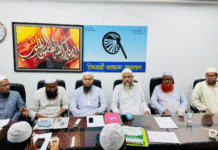

Prime Minister’s ICT affairs adviser Sajeeb Wazed Joy has said the seed of the ultimate freedom of Bangalees was sown through the six-point demand in 1966, a milestone in the nation’s long struggle towards liberation.
The six-point charter, raised by Father of the Nation Bangabandhu Sheikh Mujibur Rahman, was the foundation pillar of the Bengali nation’s movement for their rights, he said in a Facebook post from his verified account on Tuesday.
“It was the instrument of freedom for Bengalis. A victim of prolonged persecution, injustice, and indiscrimination, the nation got a new direction through the six-point movement,” he wrote in his Facebook post that accompanied a web link of an article titled “Six-Point Demands: Roadmap for Bangladesh’s Emancipation.”
On March 18, 1966, a booklet titled, “The demand for our existence: six-point initiative”, attributed to Bangabandhu, was circulated in a conference of the Awami League council, Joy wrote. Bangabandhu Sheikh Mujibur Rahman toured districts to drum up support for the initiative.
On June 7, 1966, a countrywide strike was enforced to realize the six-point movement. Police and EPR fired bullets and beat protesters indiscriminately.
Eleven Bangalees, including Monu Mia, Shafique, and Shamsul, in Tongi, Dhaka, and Narayanganj embraced martyrdom, a sacrifice compelling the nation to observe the day as the ‘Six-Point Day’.
Alarmed at the successful strike of June 7, then military dictator Ayub Khan hatched another conspiracy to hang Bangabandhu by implicating him in the Agartala conspiracy case. But, the historic 1969-mass uprising foiled all these schemes, according to Joy’s Facebook post.
He encouraged his followers on Facebook to read the entire article to equip themselves with the knowledge of the six-point movement – from its inception to execution and pass the undistorted history to the young generation.









